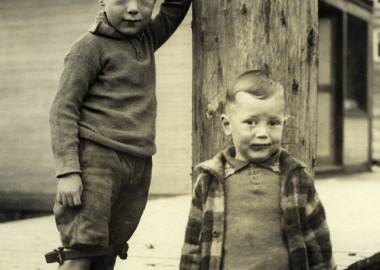
One of the great things about going fifteen-plus years without a television, oddly enough, is all the television commercials waiting for you.
O, the internet. It concentrates some joys—the trivial ones—in a stream so thick it creaks, disperses others into vanishing space.
My colleague Jane Hope wrote recently of one of great early victories from the modern era of content marketing, Chrysler’s “Born of Fire” campaign. The ad marries three distinct narratives of overcoming—those of the City of Detroit, the rapper Eminem, and the automaker Chrysler—and is thought to have single-handedly reversed declining sales of the Chrysler 200.
But I’m intrigued by a great later victory, one that comes courtesy of another august automaker facing a terminal diagnosis. Unlike Chrysler, which in 2011 addressed its mortal threat directly, refusing to go gently into that good night, Lincoln in 2014 went…well, meta.
The ads—there are three in the inaugural campaign for the Lincoln MKC, called “In The Moment” (all are below)—feature the 45-year-old actor Matthew McConaughey, and flout just about any convention of advertising you’d care to name. They don’t really push the brand. They barely feature the product. And they’re oblique, substituting aesthetic background for foreground to a startling degree.
In the final tally, the McConaughey campaign drove traffic to dealers, tripled Lincoln’s website traffic, and doubled the brand’s market share. It could scarcely have been a bigger success.
Depending on how you look at it, the campaign either transcends or sends up the genre of the television commercial, tempting viewers to “get” a message the company hasn’t clearly articulated. Even stranger is you can say all that without mentioning the cipher of McConaughey himself, a former Hollywood party boy and sex object who graduated to a legitimacy few saw coming.

Even if the campaign wasn’t directly responsible for the reversal of the luxury marque’s fortunes, I’d suggest it constitutes a fresh contribution to the annals of corporate rebranding, and a rich seam of new ideas. That it led Lincoln sales—which hit a 32-year low in 2013—to a 16 per cent leap the next year compels us to take a closer look.
Here, then, are three rebranding examples I’d suggest Lincoln sets for the rest of us.
You can go forward by going back
This is the most straightforward sentiment of the campaign, although McConaughey, the narrative midnight rider, expresses it in a philosophical ramble. It’s a sign of things to come:
“Sometimes you gotta go back to actually move forward. I don’t mean going back to reminisce or chase ghosts. I mean going back to see where you came from. Where you been, how you got here—see where you’re going. I know there are those that say you can’t go back. Yes, you can. You just have to look in the right place.”
The point? Okay, fair enough, pick your battles. It’s hard to see Lincoln, from the back of the pack, making a strong bid to outsleek and outfuture the luxury segment-leading Germans (Mercedes, Audi, BMW) and Japanese (Lexus, Acura). It’s a crowded field and message space. The 99-year-old brand does have history on its side, though, and has at times embodied a peculiarly American grandeur, even if those instances too often resided near a specifically American excess. Looking in the right place, as McConaughey suggests, will entail more 1950s (i.e., classic styling, presidential limousines), and less 1980s (i.e., chocolate-brown, gas-guzzling land yachts).
Don’t be afraid to throw out the playbook
Does it wander too near a queasy notion—taking marketing cues from Al Qaeda or ISIS—to observe that when terrorist groups are successful in their aims, it’s because they’re asymmetrical and unpredictable? To take on the big boys, an insurgent Lincoln needs chaos and confusion on its side.
Perhaps so. For a Lincoln at its lowest ebb, then, the #InTheMoment campaign constituted a Hail Mary—a pass you’d never throw in ordinary circumstances, but these aren’t ordinary circumstances. All the world loves an underdog, and Americans in particular love a comeback story. Why not throw out the playbook and do something crazy, like pinning your luxury-car rebrand to a Hollywood star having a hallucinatory conversation with an 1800-pound cow? You probably won’t regret it.
Embrace the boos
Jon Stewart has said the mark of full-fledged standup comic is the capacity to “lean in” when you’re bombing, to savour it. The idea is that embracing failure, real or potential, confers on the individual psychological fullness.
As Lincoln demonstrates, there’s a lesson there for brands. To take such a risk requires self-actualization, and, anyway, the winds of ridicule can be turned to your own sail. Witness Jim Carrey’s hilarious spoof of “Intro,” for Saturday Night Live.
And Ellen Degeneres’s, less funny, but definitely viral sendup of “Bull”:
Lincoln global director Matt VanDyke, in conversation with Fast Company, called the parodies “icing on the cake.”
“SNL takes shots at everyone with a sense of fun, and believe it or not, on the Monday after it aired, I was getting calls from dealers telling me they had people coming in and asking to see the vehicle that was in SNL spoof. These people were telling our dealers that they’d never seen the car or considered Lincoln until seeing the spoofs—and many actually bought the car based on those visits. So the spoofs actually sold cars, too.”
In the final tally, the McConaughey campaign, and its attendant social buzz, drove traffic to dealers, tripled Lincoln’s website traffic, and helped the brand hit about 10 per cent market share in the fourth quarter of 2014, double its brand average. It could scarcely have been a bigger success.
For all the lustre of Lincoln’s McConaissance, however, the road ahead traverses difficult, maybe impassable, terrain. The brand languishes in eighth place in North American luxury sales, behind Infiniti, Cadillac, Acura, Audi, Mercedes-Benz, Lexus, and BMW (although the Chinese market glints with promise).
Either way, McConaughey can’t be much worried about the future. Doubtless, he’s philosophical—whatever will be, will be. Besides, who would say he and the Lincoln team haven’t more than earned a few minutes of basking #InTheMoment?




